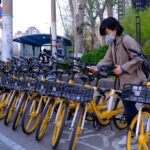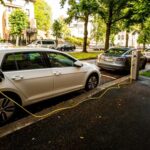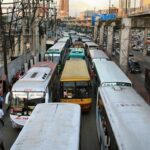Posts tagged with 'United Kingdom'
In the summer of 2024, Dutch citizens ranked climate change as the most serious problem facing the world. Just a few months later, they elected a national government that ran on a platform of pulling back its climate policies. This isn’t just ...

Much of Europe sweltered in August 2025 as a heat dome spread across the continent, pushing peak afternoon temperatures to over 40 degrees C (104 degrees F) in France and Spain. Meanwhile, parts of Greece, Turkey and Albania battled historic and devastating ...

As micromobility becomes a more widespread part of urban transportation, many city governments are eager to understand the environmental impacts of shared electric scooters and bikes. However, implementing cities often find that evaluating the environmental impact of micromobility is challenging. ...

What does it take for cities to create a true systems change that creates a holistic, positive shift of the entire urban system? Finding and celebrating examples of this feat is at the heart of the WRI Ross Center Prize for Cities. Since ...

2024 has been a tumultuous year: More than half the world’s population went to the ballot box — some voting for radical change — extraordinary weather events have devastated communities and countries have been rocked by continued violent conflict. Given ...

Daily commutes via car have evolved into more than mere trips – they greatly influence both our mental and physical well-being. Research shows that relentless car journeys don’t just occupy our time, they significantly shape our mood and overall outlook ...

Last year shattered global heat records. The world witnessed the effects of rising temperatures in the form of devastating wildfires, severe flooding, extreme heatwaves and more. Poor countries and communities who have contributed the least to causing the climate crisis ...

Public transport is one of the best, most cost-effective solutions available to address today’s climate and development challenges. Buses and trains can reduce greenhouse gas (GHG) emissions by up to two-thirds per passenger, per kilometer compared to private vehicles. The UN’s latest ...

A new digital platform being piloted in cities around the world is making public transportation more efficient, economical and accessible, while encouraging low-carbon travel. Mobility-as-a-Service is an on-demand service that integrates various forms of transportation services into a single platform accessible ...

By Sophie Boehm, Clea Schumer, Emma Grier, Louise Jeffery, Judit Hecke, Joel Jaeger, Claire Fyson, Kelly Levin, Anna Nilsson, Stephen Naimoli, Joe Thwaites, Katie Lebling, Richard Waite, Jason Collis, Michelle Sims, Neelam Singh, William Lamb, Sebastian Castellanos, Anderson Lee, Marie-Charlotte Geffray, Raychel Santo, Mulubrhan Balehegn, Michael Petroni and Maeve Masterson on November 20, 2023
Today’s climate change headlines often seem at odds with each other. One day, it’s catastrophic wildfires wreaking havoc around the world; the next, it’s an optimistic piece on the rapid scale-up of solar and wind power. Taken together, such stories ...

Electric vehicle sales have been growing exponentially due to falling costs, improving technology and government support. Globally, 10% of passenger vehicles sold in 2022 were all-electric, according to analysis of data from the International Energy Agency. That’s 10 times more than ...

With cities facing population growth, changing work patterns, the climate crisis and ever-widening inequality gaps, improved transportation systems are critical. City governments and local leaders are uniquely positioned to foster innovation to serve public needs. Teaming up with private sector ...

Transportation connects us to one another. It’s how we get to school and work, how we visit our families, and how we access our food and health care. It’s also how we ship goods and deliver services. As economies and ...

The WRI Ross Center Prize for Cities is the premier global award celebrating and spotlighting transformative urban change. The five finalists for the $250,000 prize come from very different urban environments — in Kenya, Argentina, Mexico, India and the United ...

This is part one of our series on urban freight and achieving a “triple zero” bottom-line: zero emissions, zero road deaths and zero exclusion from core services and opportunities. A line of trucks files patiently into the Port of Shenzhen. ...

























![5 Finalists Transforming Urban Spaces: The 2020-2021 Prize for Cities [PODCAST]](https://thecityfix.com/wp-content/uploads/2021/06/PfC-podcast-690-150x150.jpg)


